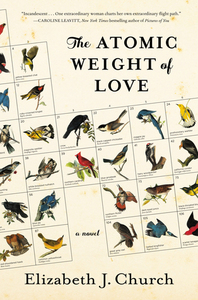Take a photo of a barcode or cover
emotional
reflective
sad
slow-paced
Plot or Character Driven:
Character
Strong character development:
Yes
Loveable characters:
Complicated
Diverse cast of characters:
No
Flaws of characters a main focus:
Yes
emotional
hopeful
inspiring
reflective
sad
slow-paced
Plot or Character Driven:
Character
Strong character development:
Yes
Loveable characters:
Yes
Diverse cast of characters:
No
Flaws of characters a main focus:
Yes
This book spend the life a woman named Meridian from her years of college through her late 80's. It covers her love of birds, her want to be an ornithologist, her marriage to man who helped create the atomic bomb, her years of depression as a woman who want aloud to fulfill her dreams, a love affair, her freedom, and all the mental hardships she represents in woman of this time period. I cried out of love of the characters, her pain in her feeling of being smothered from living her dreams and the realities of grief. Great book.
emotional
informative
reflective
medium-paced
Plot or Character Driven:
Character
Strong character development:
Yes
Loveable characters:
Yes
Diverse cast of characters:
No
Flaws of characters a main focus:
No
A beautiful story of the human experience and the challenges women face during the formative young adult years. Meridian is an admirable example of how it’s never too late to follow dreams, even if they change throughout a lifetime.
emotional
hopeful
informative
inspiring
reflective
sad
medium-paced
Plot or Character Driven:
A mix
Strong character development:
Yes
Loveable characters:
Yes
Diverse cast of characters:
No
Flaws of characters a main focus:
Complicated
challenging
emotional
reflective
sad
medium-paced
Plot or Character Driven:
Character
Strong character development:
Yes
Loveable characters:
Complicated
Flaws of characters a main focus:
Yes
emotional
hopeful
informative
inspiring
reflective
sad
medium-paced
Plot or Character Driven:
Character
Strong character development:
Yes
Loveable characters:
Yes
Diverse cast of characters:
Yes
Flaws of characters a main focus:
Complicated
I was drawn to this book because of its beautiful cover, the subject matter including physics and ornithology, and its publisher, Algonquin Books. It's a lovely read. Favorite parts - the chapter headings (collective bird nouns), the mention of Richard Feynman, and the inclusion of a crow funeral. Read and enjoy!
emotional
reflective
sad
medium-paced
Plot or Character Driven:
Character
Strong character development:
No
Loveable characters:
No
Diverse cast of characters:
No
Flaws of characters a main focus:
No
Sometimes I think modern authors will write period pieces as an excuse to be racist, but 👌🏻





